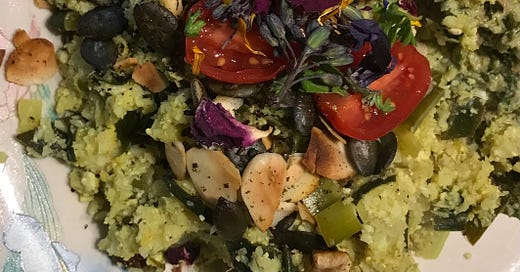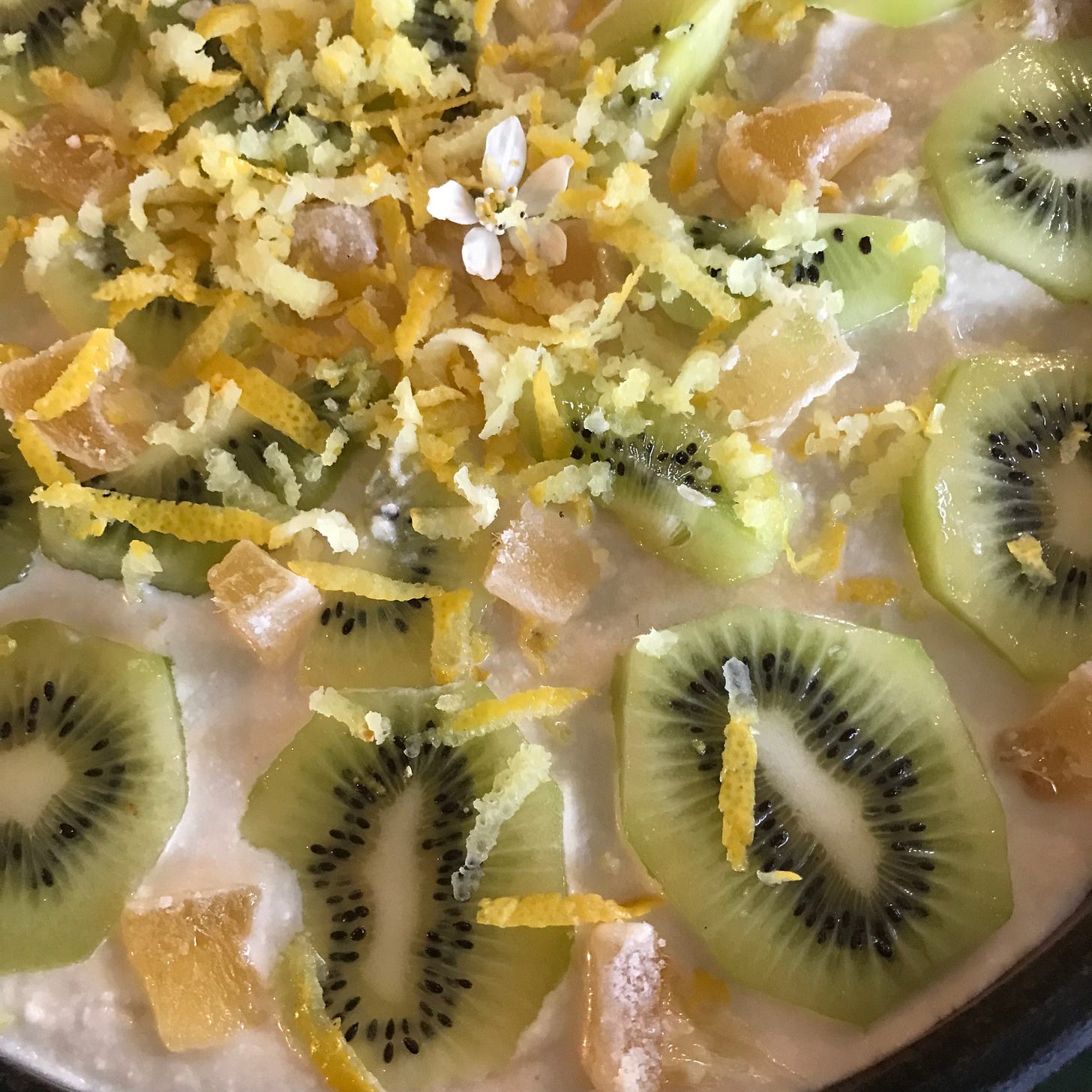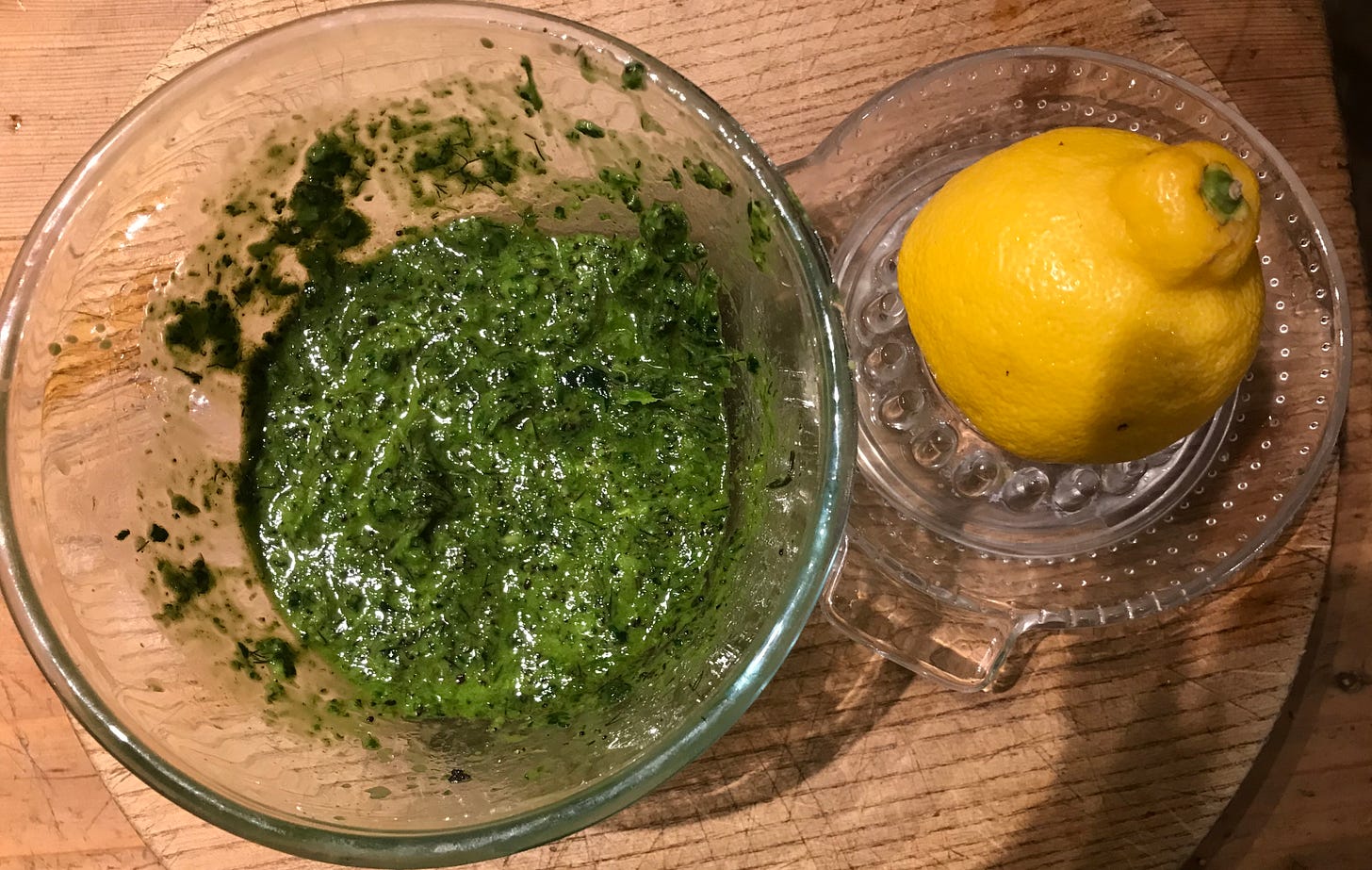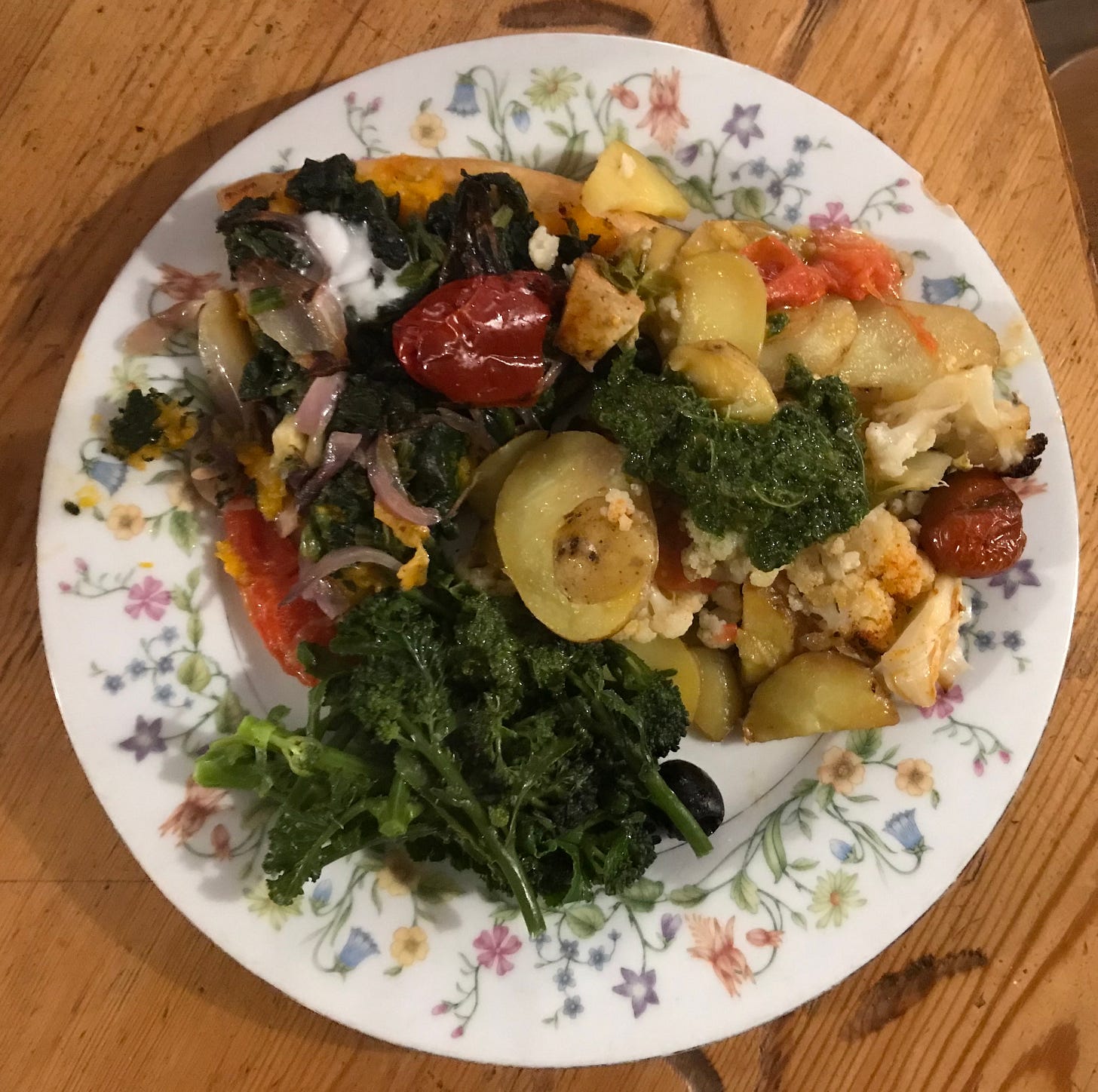50 Wherever you were, it was bringing you here...
& one thing you can do to help – well, everything
A vegan revolution
If you had told me even ten years ago that I’d be writing about food, I’d have laughed. If you’d told me I’d spend quite a lot of my future life growing food, thinking about it, preserving, processing, making and writing up recipes and cooking and eating them, instead of my full-time work with more ‘creative’ writing, and leading holistic writing retreats, I’d have been horrified.
Things have changed. More and more of us now know that climate change is a serious reality that we can no longer ignore. More and more of us know that that is largely down to our diets.
I’ve changed: we have moved to Brittany and a small eco-project that is about sustainability: growing in harmony with the climate, seasons and surrounding ecosystems and biodiversity, and we spend much of our time cultivating the beautiful land we tend, with care. Currently, we provide a great deal of our own food and, somehow, cooking and baking have crept up on me as relaxing things I positively enjoy doing.
I’ve also moved from being vegetarian to being vegan. That’s relevant to my focus on food; and these paragraphs are in part excerpted from the intro to my newly-finished vegan cookbook. I suppose I have wanted to prove to myself that one could eat very well, healthily and deliciously, without eating animals or their offspring or secretions.
We had friends visiting briefly last summer. ‘Do you always eat like this?’ she asked. ‘It’s utterly delicious.’ Well, yes. Although TM is not the ‘foodie’ I am, and is not a full vegan, we take it in turns to cook a vegan evening meal and put some effort into it, as a) there is something so pleasing about using so much of our own produce, and b) cooking for each other is a ritual that bookends our day, the evening counterbalance to our hour together first thing with a pot of tea in silence, listening to birdsong, watching the rest of the natural world go about its morning business, or discussing some matter of philosophical or political import, or simply of practical concern like the garden. This is a luxury we didn’t have before, when tea, meditation and taking the dogs round the meadow was squeezed into 45 minutes for TM who was an eco-builder and started work early each day (I could then walk the lanes when he’d left with the dogs and still be at my desk by 9.30).
Then, growing food was squeezed in between full-time work (in my case more than full-time), whereas now it’s a large part of what we do, and part of an integrated approach to treading lightly on the earth.
We, myself and TM, are thinking about food resilience into the future, for us and our families, our friends and neighbours, the local community, should that be necessary, and for whoever comes after us.
We are bearing in mind particularly how we can minimise damage to the earth. Is there anything more important, in fact, than how we live on this beautiful, abundant, generous small planet, third in line from the sun, perfectly and uniquely calibrated for human, other animal, and plant life?
And what, materially speaking, is more fundamental than what we put into the earth (and water, and air), and into our bodies?
The best possible thing we can do, as a small contribution to the planet and other species, for reasons I list below, is to stop eating animals and their secretions, or at least reduce our reliance on them. And we can change our methods of food production to ones that are also kind to the soil, the immediate environment, our local ecosystems and wider biodiversity.
Food is a celebration of life
So although I’d never have said before that I really enjoy cooking, I find that I do. I believe that food is a celebration of life, and that good food, cooked with love and shared, is a great source of pleasure and companionship. There is a bond created by the act of sharing food. (I love that the word ‘companion’ comes from ‘cum pane’, one/s with whom one breaks bread.) How much better if that food is produced without cruelty and killing, as well as enhancing the health of our ecosystems.
I’ve also discovered a great and interesting spread of food writers on Substack, not all vegan. (Not having TV, I missed out on, for instance, the Hugh Fearnley-Whittingstall phenomenon, but I’m enjoying catching up with his DVDs, and those of Yotam Ottolenghi.) I very much enjoy reading Jack McNulty, who is vegan, a lovely human being, and writes a fascinating blog. I’ve made a number of his recipes – invariably good. Will, ‘A Private Chef’, is not vegan, but writes interestingly about where he works and how he sources his food, much of which is grown on-site or foraged. Michael Corthell posts occasional vegan recipes and offers well-researched in-depth pieces on the ethics, politics and philosophy of our treatment of animals. Mark Diacono writes a good recipe-based Substack – heavy on veg (and gardening), but not vegan. You might enjoy Kathy Slack’s recipes (also not all vegan). The Peasantry School is not a vegan blog but is an attempt to live differently, often written movingly. The Dendroica Project’s Markael Luterra, while rarely writing about cooking, shares my passion for an ecological spirituality – and knows how to thresh, winnow and prepare quinoa!. Finally, for the moment, Colleen Patrick Goudreau writes intelligently and compassionately about animal welfare – and also our human relationships.
What makes a cook?
I don’t think of myself as a particularly good cook; I like experimenting, and often it doesn’t work. But often, it does. What I am good at is looking at what we have in garden (almost all year round), fridge or larder, or what’s in season in the local market, and inventing interesting and tasty ways to use that.
It’s not an over-statement to say that I see food (also) as medicine.
I think the big thing is we have choices. We’re fortunate in the affluent Western world in this way.
Where it began for me
Many children are sensitised to cruelty to animals; it is to our shame that we do not raise them in an adult world that is sensitive to such things too, instead brutalising their finer feelings, or shutting away the subjects of cruelty in increasingly larger and more dehumanised intensive units so that none of us has to witness their suffering.
Meantime, the meat-and-dairy industry sells us the romantic images of cuddly lambs, clucking chickens in orchards, pigs ranging freely over pastureland, and happy outdoor cows; the same pictures, accompanied of course with rosy-cheeked farmers and farmers’ wives, that children’s picturebooks offered us when we were young. Utterly different from the reality, of course. Sometimes it’s more subtle: ‘grass-fed’ conveys the idea of bucolic cattle and sheep tranquilly grazing in green fields, whereas what it really means is that they are reared indoors and fed silage, which is the fermented grass wrapped in huge plastic bales that you see in fields.
I’ve always loved and had an affinity with animals. I was quite young when I began to acquire a name in our neighbourhood as someone who would take in and tend sick or injured animals. Even as a child, I was distressed by what seemed like dishonesty to me in how we name the bits of animal we eat: ham, bacon, gammon, mutton, beef, veal instead of pig, more pig, even more pig, sheep, cow or bullock, very young calf.
When I was 11, I began to question and protest against the way, in our culture and times, it is normal to see animals as somehow ‘things’, as put here for our use, as, let’s face it, our captives: our slaves. A resource for our benefit. My view hasn’t changed, except that I now live these ideas as much as I possibly can.
This is speciesism; to my mind as bad as racism or sexism.
Living as a maker
For most of my life I’ve focused on and valued the more rarefied air of the imagination, ideas, and the life of the mind. (I’ve also focused very much on ‘the wild’; see below.)
As a writer I am also a maker. But I look back and realise how most of my adult life has been about making material things, and making my own living and my future with my hands and my creativity. I have indeed lived what Clarissa Pinkola Estes calls ‘the hand-made life’: being stubborn enough as to be a self-employed creative maker all my adult life, following my own star, refusing employment in favour of finding my own way and living by it, turning my back on mainstream society’s insistence on being a cog in the wheel of ‘the system’, living according to what my heart knew was right.
That path has brought me to this place of extreme simplicity (in theory!) in how I spend my time: attend to the wild, cultivate a little of it in harmony in order to produce much of what we need ourselves, invent ways of processing that in as healthy and tasty a manner as possible, make what I can that we need in addition, and write about it (though I am still a poet and author in other interconnected areas).
And a ‘wild child’
I was the original ‘wild child’: from the age of 11 I was able to lose myself in the meadows, woods, hills and beaches of North Devon, out all day or before or after school tracking wild animals and birds, occasionally bringing back injured ones, on foot or bike or with my wild young pony, bought as a foal from Dartmoor with the £25 of my Post Office savings, and where the deal was that I would need to fund his rented field care myself, so I did a newspaper round and cleaned out breeding cat kennels either side of the school day.
As a teenager, I would take a kayak down to the confluence of the Taw and the Torridge at first light, gliding among geese and swan in translucent mist; later still, a Malibu surfboard, off which I spent most of my time falling. I took every risk going, and my parents, who barely knew where I was much of the time (that seemed OK in the 60s and 70s) would have been horrified if they knew of the many close calls.
Later, I dropped out of academia and hitchhiked (no, my parents didn’t know I was hitching, and I’d have hit the roof if my own daughter did) to the Pyrenees, where I first came across the tragic history of the Cathar persecution – you can’t avoid it in the Pyrenees – and had a number of strange experiences that led, much later, to the almost-automatic writing of my first novel, Imago, which is set partly in C13th France and partly in late C20th Devon.
At that time, I also started to make my way forward by collecting wild dye plants, spinning, dyeing, designing, knitting and selling a range of clothing.
I learned about healing herbs, about wild food, about therapeutic and healing modalities, about Zen and druidry.
As a single parent, I got by, just, with the learned skills of my hands. After that I was a shoemaker for 14 years: using animal hide, of course (very difficult emotionally, as a vegetarian since I was 16), and as always and since, just getting by financially. Then my first book was commissioned – a ‘mind body, spirit’ title focusing on the power of myth to shape our lives – by Element Books, the biggest publishers of psychospiritual topics back in the day. I’ve written about this elsewhere, so I won’t repeat it; but needless to say that if I thought I lived on a pittance before, being a full-time writer really honed that skill!
It was all bringing me here...
Just before that commission, in the early 90s, I knew I’d found my future. I stood up to lead my first-ever workshop (apart from some poetry ones, unpaid, in my daughter’s school) on ‘Myth as Metaphor’. I knew then with no doubt whatever that I’d been born to write, and to offer holistic writing workshops, as I still do. Do you know that feeling, when you realise everything has been leading to this moment/place/time/way forward?
I’ve been writing about and offering workshops on the Grail corpus and specifically the Wasteland and the rape of the Well Maidens since the early 1990s. All that’s relevant to say here is that it’s my view that the Wasteland in which we live, outer but also inner, has occurred as a result of destructive human activity, notably in relation to power, violence and land grabs and the exploitation of other species (and some of our own), and a championing of rational mind over the values of the heart (yes, we need both, but they are currently out of balance). Whatever little we can do to reverse that might only be a drop in the ocean, as they say; but then, what is the ocean made of?
So since 1993 I’ve been writing about our need for new stories that celebrate the earth, kindness, compassion, and the general values of the heart, that challenge our cruelty to other species, to begin to reseed the Wasteland. 30 years later, this need is if anything even more pressing than before.
Well, my vegan book addresses this in a direct way.
Our species’ speciesism takes the form of a belief that the earth and her other-than-human inhabitants have been put here for our use, and that they don’t have any rights of their own. For me, being vegan is a way of living out a kinder way: for animal welfare, for sustainable non-destructive methods of growing our food, for reducing the enormous impact of animal agriculture on land use, water stress, pollution of earth, air and water, and deforestation; and also for human wellbeing.
Quite apart from the human health issues associated with a high meat and dairy consumption, 82% of the world’s starving children live in countries where grains and crops are grown primarily to feed the vast indoor population of meat animals, largely for Western consumption. We could feed so many more people, some say ten times as many, and still allow vast tracts of forest to regenerate if we ate the grains and beans direct (there is a widespread belief that most of the cereal crops in the UK are grown for human consumption: wrong. A great deal are fed to livestock, and that is an extremely inefficient way of producing protein for human consumption. And don’t get me started on sheep denuding the uplands, as if said uplands are no use unless they’re being grazed by animals we exploit.)
The shadow
On a personal level, the domestic life and cooking have been very much in my own shadow, as Jung would have it: those parts of me that are unconscious, ignored or denied, in my case as unnecessary trivia, focused as I have been on the imagination, and the wild and all its elements. I hated the thought of domestication. I adored my mum, who was ‘domesticated’, but admired and emulated my father, who in many ways lived a much wilder and, as I saw it then, freer, life. (Of course, we make our own cages, and they can be very different from what we first think, and also from others’.)
The thing about shadow material is that if one doesn’t turn and face it, it will bite you on the bum, so to speak – you will meet it ‘out there’ in one form or another. It is a psychospiritual necessity, for a whole and rounded life, to turn to face what we don’t know or don’t like about ourselves, and acquaint ourselves with it and integrate it (or attempt to).
What a relief…
For myself, I’ve had a rough year, healthwise. This time last year I was steeped so deeply in extreme anxiety and severe insomnia that I lost a sense of myself. I’d had various physical health issues and a lot of stress, partly to do with post-Brexit visa issues, as I’ve mentioned before; partly to do with loss of income since being here. And now, as some of you know, at the busiest time of our growing calendar, I’m immobilised with a broken foot. And then there is the State of the World, which is heartbreaking, much of the time.
The thing that has been most helpful in getting ‘relief from the wound’? The thing I dismissed as trivia. Cooking and baking. I would never have thought that could be the case. (Domestication. Perish the thought.)
For many years now, I have been cultivating my outside garden and growing things. This has gone alongside my cultivating my ‘inner garden’. The former has grown out of a desire to be as self-sufficient in food as possible, and also to attempt to contribute in a tiny way to the ‘sum of good’ rather than being a destructive presence; and being vegan has meant really informing myself. Inevitably, it has coloured not only the way I cook, but also the way I think about cooking and my desire to do it well, and to communicate that. But I never thought of cooking as being a central player in my life until recently.
So maybe I don’t need to think of it as domestication; rather, a choice to live well and kindly at each step, out of congruence.
Meantime, there’s that book to tidy up (proofreading and a little pruning still); expect some more recipes soon. Oh and I’ll tell you why and how the dog is (very healthily and enthusiastically) vegan too.
Thank you for reading, as always, my friends. Enjoy the spring fires of May, and I wish you creativity and a gentle ‘earth-walk’.
All those recipes shown are in the book, mostly cooked in our case from our own veg and fruit.











Really potent writing here, a fine advertisement for the vegan cookbook. And those lovely photos...!
Cooking has been my refuge for years. It's a solace, especially when I'm cooking things I've grown in my own garden. But more than that, to me it's a special kind of magic, making food for the people I love. It's definitely a strong antidote to the questionable values of the Big World: it's slow, caring, mindful, and wonderfully sensual/sensory. I look forward to your cookbook to add to my collection.